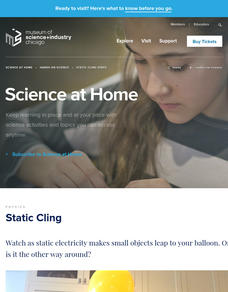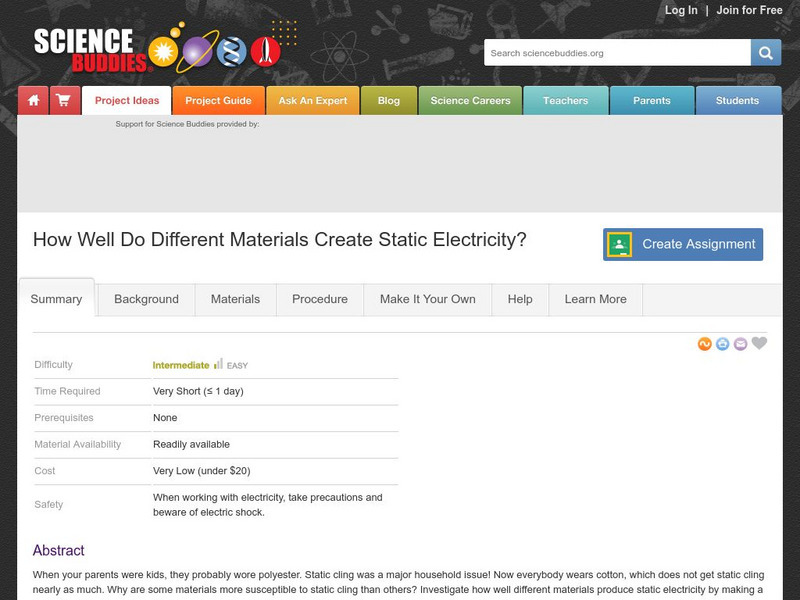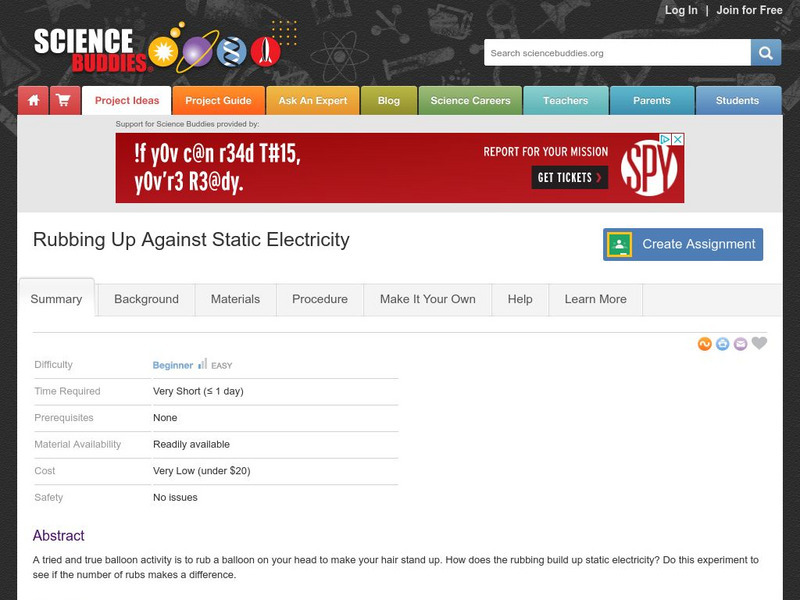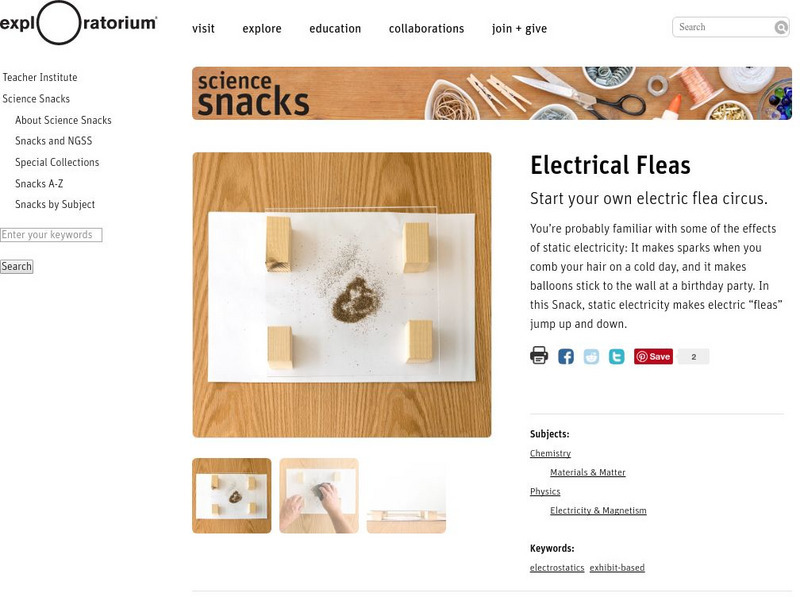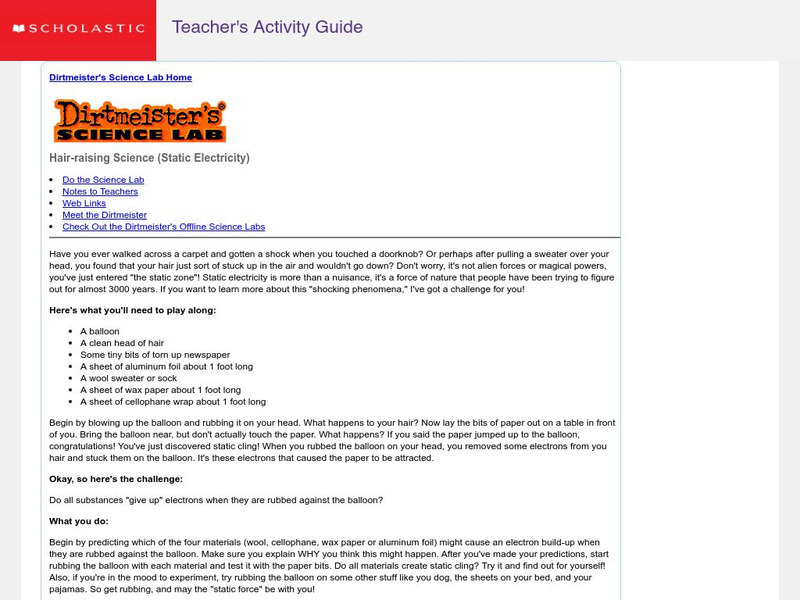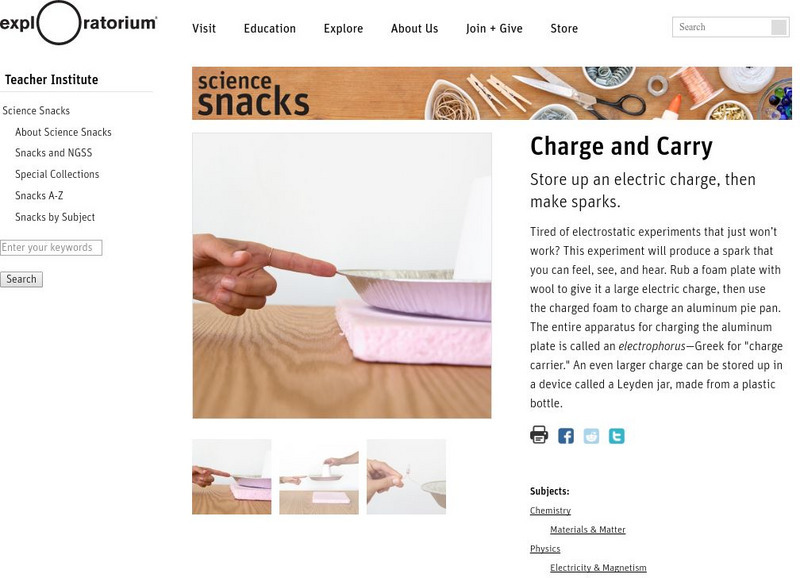Exploratorium
Holding Charge
Slide paper over a plastic straws to generate static electricity, and then stick that straw to glass, a wall, or even your own hands! This is a science activity that students can use to show parents what they learn in school whenever...
Museum of Science
Static Cling
Cling to a lesson on static electricity. Pupils take part in experiments where they see how paper from hole punchers, packing peanuts, puffed rice cereal, and other items react when placed near a rubbed balloon. They learn how electrons...
Teach Engineering
Weather Alert
Every time a bell rings ... there is lightning in the area. The activity provides directions to build a model of a lightning detection system. Similar to a system designed by Benjamin Franklin, the system uses static...
DiscoverE
Oranges and Batteries
Orange you glad you can make circuits using fruit? Young electricians learn about electric circuits and electricity. As part of the lesson, they build a circuit with an orange and then with a banana.
National Science Teachers Association
The Ethanol Project
In a mock senate hearing regarding the development of ethanol as a fuel source, each person in the class is assigned a role to play and must uphold the stance of their character. Once the senate hearing is complete, each person writes a...
Science Buddies
Science Buddies: How Do Different Materials React to Static Electricity?
Polyester clothing was generally accepted as a popular trend in fashion at one point in history. Now everybody wears cotton, which doesn't get static cling nearly as much. Why are some materials more susceptible to static cling than...
Science Buddies
Science Buddies: Rubbing Up Against Static Electricity
A tried and true balloon activity is to rub a balloon on your head to make your hair stand up. Learn how the rubbing builds up static electricity using this experiment to see if the number of rubs makes a difference.
Science Bob Pflugfelder
Science Bob: Bend Water With Static Electricity!
Contains a procedure for illustrating electrostatic attraction between opposite charges by causing a thin stream of water to bend. The site gives a brief discussion of static electricity, as well.
Science Bob Pflugfelder
Science Bob: Roll a Can With Static Electricity
Science Bob presents instructions for a science demonstration on how to roll a can with static electricity using common supplies with information on how it works.
Exploratorium
Exploratorium: Science Snacks: Electrical Fleas
Create your own "flea" circus in this activity by using the effects of static electricity. Students will observe a charged object attraction to the opposite charge causing the object to jump.
Scholastic
Scholastic: Dirtmeister's Science Lab: Hair Raising Science
A great experiment to show students how electrons move by static electricity. This site includes web links, a challenge question, and notes for the teacher.
Museum of Science
Museum of Science and Industry: Online Science: Cling to Me
A set of four station activities involving static electricity that can easily be done in the classroom.
Exploratorium
Exploratorium: Science Snacks: Physics/electricity & Magnetism
Exploratorium Science Snacks are miniature science exhibits and experiments that can be made with common, inexpensive, easily available materials. These electricity snacks represent a set of devices that you can build and experiment with...
Science is Fun
Science Is Fun: Bending Water
An experiment where static electricity is used to 'bend' a stream of water flowing from a faucet. Includes a detailed explanation of how this works.
Science is Fun
Fun Science: Bending Water
Find out how you can bend water with the help of static electricity. All you'll need is a faucet and a comb.
Other
Science Hobbyist: Sticky Electrostatics
A series of activities focusing on charge interactions, charging methods, and the conservation of charge. Activities utilize scotch tape and other readily available items. Includes explanations of what is happening.
Exploratorium
Exploratorium: Science Snacks: Charge and Carry
This site from The Exploratorium Museum is a full description of a short activity. An electrophorus plate and a Leyden jar are made. The electrophorus is charged by induction. Its charge is transferred to the Leyden jar by conduction...

